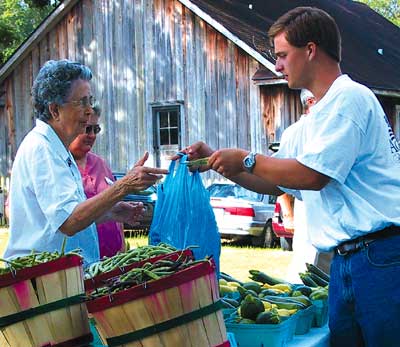“Farmers, Elderly Benefit From Nutrition Program”

Many of Alabama’s senior citizens enjoyed growing their own fruits and vegetables when they were younger, but as age and urbanization changed their lives, their eating habits also may have changed.The Farmers Market Nutrition Program (FMNP) is changing all that by offering seniors and low-income families vouchers they can use to purchase fresh produce directly from farmers at approved markets around the state.”The FMNP not only improves the diets of recipients, but also is designed to expand awareness and use of farmers markets,” said Don Wambles, director of the State Farmers Market Authority (FMA) and president of the Pike County Farmers Federation.Currently, the program is available in 44 Alabama counties. The vouchers can be redeemed at 50 farmers markets and more than 80 roadside produce stands. Wambles said the program has put well over $1 million back into the pockets of Alabama farmers during the past three years.In addition, he said the program is changing the eating habits of the seniors and Women’s Infants and Children’s (WIC) program recipients who use the vouchers.”These programs facilitate the purchase of something that is to be prepared once you get home as opposed to buying greasy fries and a burger. This takes time and effort,” Wambles said. “We cannot give up on our young mothers and children. They are our tomorrow. And, we cannot forsake our elderly who have provided us with the legacy of freedom we so much enjoy.” For growers, the program means additional income from customers who might not otherwise visit a farmers market.”It’s made a good bit of difference,” said Frank Bryan, who sells at the Pioneer Farmers Market in Troy. “I’ve got a lot of vouchers since the market opened up here–a lot of vouchers. I think it’s real good for seniors, and it’s good for the growers, too. Real good.”The Alabama Farmers Market Authority administers the program through a cooperative agreement with the Alabama Department of Senior Services, the Cooperative Extension System and the Alabama Department of Public Health.The FMA is collaborating with the Department of Senior Services and local Councils on Aging to identify and distribute the food coupons to eligible seniors. Anyone age 60 or older is eligible for the program, if their household income is less than 185 percent of the federal poverty level–or about $1,800 for a family of two per month.”Most of the people that receive the coupons have to decide whether they’re going to pay their utility bills, buy prescription drugs or buy food,” Wambles said.
“Most of the time, food is their third priority. So we’re assisting them with coupons to buy food that they normally would not buy.”The FMA received $912,246 from the U.S. Department of Agriculture to administer the program in Alabama. Nationally, the nutrition programs for seniors and WIC participants were funded at $40 million for fiscal year 2002. According to USDA, more than 400,000 seniors nationwide will benefit from the program.Interested seniors are encouraged to contact their local Council on Aging or the FMA at 1-877-774-9519. Alabama farmers wishing to participate in the program should contact the FMA at (334) 242-2618 or email Wambles at: dwambles@fma.state.al.us.
